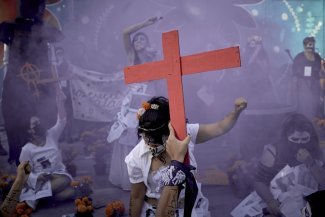The recent election of one of Swaziland’s leading pro-democracy activists to parliament should be a watershed moment for those calling for change in Africa’s last absolute monarchy.
But not everyone is so optimistic.
Jan Sithole, the former Secretary General of what was then the Swaziland Federation of Trade Unions (or SFTU, which along with the Swaziland Federation of Labour and Swaziland National Association of Teachers merged to form Trade Union Congress of Swaziland, or TUCOSWA) and current leader of the Swaziland Democratic Party, became one of 55 elected Members of Parliament in September.
It was an election in which political parties couldn’t take part so Sithole stood as an independent candidate for the highly-contested Manzini North seat.
Speaking to Equal Times Sithole said that he plans to use the country’s constitution to bring about change in Swaziland and to help ensure that its citizens can enjoy basic human rights.
“MPs and other citizens are not allowed to speak in the state-owned broadcast media yet the constitution guarantees freedom of expression,” cited Sithole as an example. “All this must change.”
He said he was prepared to pay the price at whatever cost in carrying out his duties.
But his former colleagues in the trade union movement are concerned that Sithole will be a lone voice in calling for democratic change and will therefore find it difficult to transform ordinary lives.
“As an individual it would be difficult for him to make a contribution that would benefit the masses,” TUCOSWA’s current Secretary General, Vincent Ncongwane told Equal Times.
The government banned TUCOSWA a few months after registering it last year making it impossible for the organisation to hold events without security forces breaking up meetings and violently attacking workers.
It moved prompted condemnation from the International Trade Union Confederation (ITUC) and the International Labour Organization (ILO).
In a recently released Report of the Committee on Freedom of Association, the ILO has strongly urged the government to allow TUCOSWA to exercise its trade union rights, “in accordance with the principles of freedom of association, including the right to engage in protest action and peaceful demonstrations in defence of their members’ occupational interests.”
International instruments
Almost 70 per cent of the Swazi population lives on less than one US dollar a day and the official youth unemployment rate is 53.3 per cent – although the true figure is thought to be much higher.
Ncongwane told Equal Times that even if Sithole was appointed Minister of Labour and Social Security it would not do much to help the cause of Swazi workers because he would have to answer to his principals.
“What would help the cause of workers is international pressure on the basis of the international instruments that the country is signatory to,” said Ncongwane, referring to the various ILO Conventions as well as the Universal Declaration of Human Rights and the Banjul Charter, amongst others.
Pressure is mounting on Swaziland: the African Union recently called for fundamental changes to the Swazi constitution to allow for basic human rights like freedom of speech and assembly.
However, Ncongwane says that his scepticism about Sithole’s appointment is not directed at the man himself but at the system he is apart of. He even commended his former colleague for his unswerving commitment to democracy.
“That gives me hope but [its impact] remains to be seen,” said Ncongwane.
Criticism
Sithole has been a strong critic of Swaziland’s non-political party system known as tinkhundla since his time as the Secretary General of SFTU.
In the 1990s, Sithole led workers into crippling protest action in a call for multiparty democracy.
But Ncongwane said it would be unfair to have high expectations from Sithole as an MP in a system that remains resolute in its quest to silence any dissent, even within parliament.
He referred to an incident where the Prime Minister, Sibusiso Barnabas Dlamini, warned elected MPs against participating in meetings he considered not to be “transparent”, just two days after the election.
Speaking at a press conference, Dlamini stressed that the Anti-Corruption Commission would pounce on MPs who were found to be attending unauthorised and illegal meetings.
As TUCOSWA is a banned organisation, any public meetings under the banner of the organisation are considered “illegal”.
The Prime Minister, who King Mswati III reappointed on 28 October in the face of vocal disapproval from the unions because of his hardline stance towards workers, reminded the elected MPs that their main function was to work with the King towards the development of the country.
“They should not, therefore, respond to direction from any one other than His Majesty and the respective constituents on how they should carry out their duties,” said Dlamini.
Dlamini was responding to rumours that some MPs were meeting and lobbying ahead of their first meeting in Parliament where they will elect a speaker and ten MPs to the House of Senate.
The hostility displayed by Dlamini, who forms part of the King’s ten appointees into the House of Assembly, is an unsettling indication of the regime’s unwillingness to affect real change, said an observer who wishes to remain anonymous.
However, Sithole retaliated by hosting a week-long conference for his political party where he discussed the country’s political situation.
While Sithole is not promising miracles, he said he will do everything constitutionally possible to bring democracy and accountable governance to the Swazi people.
“Until Swazis stand up and demand their rights, no one will come from outside the country to fight for them,” he said.









